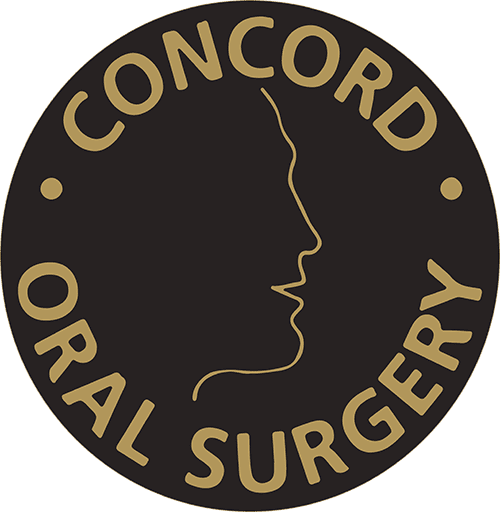Reviewed By Dr. Robert Barron, DMD
Reading Time: 5 minutes
A strong, healthy jawbone is the foundation for successful dental implants. If you have experienced bone loss in your jaw, your surgeon may recommend a dental bone graft to rebuild the bone and prepare your mouth for implant placement.
This blog outlines what to expect after a dental bone graft, including swelling, dietary changes, and each stage of the healing process.
Table of Contents
Key Takeaway
After a dental bone graft, you can expect mild swelling, dietary restrictions, and a healing period of several months. Healing occurs in three stages: soft tissue recovery, bone integration, and final maturation. Following post-operative care and attending all follow-up visits supports successful healing and long-term results from your dental implant surgery.
Why Bone Grafting May Be Recommended Before Dental Implants
Bone grafting plays a key role when bone loss has occurred in the jaw. At Concord Oral Surgery, Dr. Robert Barron uses advanced bone grafting techniques to restore bone volume before placing dental implants.
A dental bone graft may be necessary:
- After a tooth extraction to preserve the tooth socket for future implant placement.
- Before dental implants to ensure there is enough bone tissue to anchor the implant.
- To repair severe bone loss from gum disease or long-term missing teeth.
Different grafting materials are available depending on your needs. All are designed to encourage your body’s natural bone regeneration process.
Learn More About Dental Bone Grafts
What Happens Right After Surgery
You may experience swelling, bleeding, or discomfort in the first few days following the surgical procedure. Here is what you can expect immediately after your dental bone graft:
- Mild to moderate swelling: Peaks around 48–72 hours after surgery.
- Discomfort: Managed with prescribed or over-the-counter pain medication.
- Gauze pad placement: Helps control bleeding during the first several hours and protects the blood clot.
- Ice packs or cold compresses: Used in 20-minute intervals to minimize swelling around the surgical site.
Your oral surgeon will provide you with specific post-operative instructions to follow closely. These will include how to clean the area, manage discomfort, and protect the graft site.
| 💡 Ask About PRF to Support HealingPlatelet-rich fibrin (PRF) is a natural substance derived from your own blood that can be applied to the surgical site to support faster, more comfortable healing. PRF promotes tissue regeneration, reduces inflammation, and may lower the risk of complications after a dental bone graft. Ask Dr. Barron if PRF is right for your procedure. |
What to Eat After a Dental Bone Graft
The right diet supports healing and prevents complications after oral surgery. Here are dietary guidelines for the first stages of your dental bone graft recovery:
- Stick to soft, cool foods for the first 24–48 hours like yogurt, smoothies, mashed potatoes, applesauce.
- Avoid hot, spicy, crunchy, or hard foods that can disrupt the graft or irritate the surgical site.
- Gradually reintroduce solid foods as healing progresses and as advised by your oral surgeon.
- Stay hydrated and drink plenty of water, but avoid using straws which can dislodge the blood clot and delay healing
Good nutrition helps the grafting material integrate properly with your natural bone.
Understanding Dental Bone Graft Healing Stages
The healing process takes several months, but follows a predictable timeline.
Stage 1: Initial Healing (0–2 Weeks)
In the first two weeks after surgery, your body focuses on closing the soft tissue over the graft site. Swelling, minor bleeding, and discomfort are expected but manageable with pain medication and cold compresses. You should rest as much as possible and avoid any physical strain. Soft foods and good oral hygiene are essential during this stage. Blood clot formation is a crucial part of this stage, as it protects the grafting material underneath and begins the healing process.
Stage 2: Bone Integration (2–10 Weeks)
During this phase, the bone graft begins to merge with your natural bone tissue. Your body gradually replaces the bone substitute with new bone material. Though the healing is internal, it is a critical part of successful dental implant surgery. Maintain oral hygiene, avoid blood thinners unless advised otherwise, and attend all follow-up visits.
Stage 3: Final Bone Maturation (3–6 Months)
In the final stage, the graft site fully matures and hardens. The bone becomes strong enough to support dental implants. Your oral surgeon may use imaging to evaluate the density and quality of the new bone. Once fully healed, you can proceed with additional dental work such as implant placement. Depending on the procedure, this healing process may take longer in cases involving larger grafts.
Pro Tips for a Smooth Recovery
You can support proper healing and lower the risk of complications by following these best practices:
- Keep the surgical site clean by gently rinsing with warm salt water starting 24 hours after surgery.
- Do not smoke or vape, as it interferes with blood supply and bone healing.
- Sleep with your head elevated to minimize swelling during the first few nights.
- Take medications as prescribed including antibiotics, pain relievers, and any recommended supplements.
- Avoid touching the graft site with your tongue or fingers to prevent dislodging the clot or grafting material.
When to Contact Your Oral Surgeon
Healing after a bone graft is usually straightforward, but you should reach out if you experience:
- Severe or increasing pain after 3–4 days
- Pus, foul taste, or signs of infection
- Persistent numbness or tingling
- A loose graft or exposed bone material
At Concord Oral Surgery, Dr. Barron personally checks in with every surgical patient to ensure smooth recovery and optimal oral health outcomes.
Schedule Your Dental Bone Graft Consultation Today
If you have been told you are not a candidate for dental implants due to bone loss, a bone graft can rebuild your jaw and restore your options. At Concord Oral Surgery, Dr. Robert Barron uses the latest techniques in dental bone grafting to support fast healing and long-term implant success.
If you would like to learn more or schedule a consultation, visit our oral surgery office in Vaughan, ON, or call (905) 669-2616. We are located at 3300 Highway 7 West, Suite 805 Vaughan, ON.
FAQs
How long does it take to heal from a dental bone graft?
Most dental bone grafts require 3 to 6 months of healing before the area is ready for dental implant placement. This healing process allows time for the bone graft to integrate with your natural jawbone and become strong enough to support dental implants. Healing duration may vary depending on your health, age, and whether synthetic materials or natural bone were used.
Is swelling normal after bone grafting?
Swelling is a common part of the dental bone graft recovery process. It usually peaks within 48 to 72 hours and can be controlled using ice packs or cold compresses. Keep your head elevated and use a gauze pad after surgery to reduce swelling. If swelling worsens after several days, consult your oral surgeon.
Can I brush my teeth after bone graft surgery?
You should resume brushing the day after your bone grafting procedure, but avoid the surgical site directly. Use a soft toothbrush and follow all post-operative care instructions. Rinse gently with warm salt water to maintain oral hygiene without disturbing the graft site.
Is a dental bone graft painful?
Discomfort is common but manageable with prescribed pain medication. Most patients compare the experience to recovering from a tooth extraction.
Can I work the day after a dental bone graft?
It depends on the extent of your bone graft and your job demands. Many patients return to non-physical work after 1–2 days. For those undergoing complex grafting with general anesthesia or IV sedation, extra rest may be necessary. Always consult your oral surgeon before resuming regular activities.

